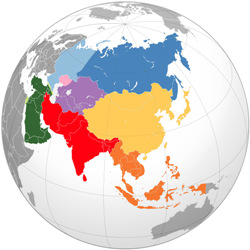A Review of Online Gambling in Asia (Part I)

Home to more than 60 percent of the world’s population, Asia has the largest gambling market of any continent, with the consistent growth in its iGaming revenues being spurred on further by the increased use of mobile devices. Still, the state of online gaming differs greatly among Asian nations due to dramatic differences in the regulation and control of their individual industries, so in order to better understand the state of online gaming in Asia, let’s take a look at the industry country by country.
China
Online gambling is wildly popular in China despite the fact that most aspects of it are considered to be illegal under Chinese Law. Only approved sites are allowed to legally accept bets for poker, casino games, sports betting and other games; however, illegal sites pop up regularly. The Chinese authorities do actively pursue those who run illegal sites as well as those involved in the business end of illegal iGaming; however, the country is not known to actively prosecute actual players.
Hong Kong
Only certain types of gambling are permitted in Hong Kong, and when gambling is permitted, it is only allowed under the management of the Hong Kong Jockey Club. Legal gambling is permitted on horse races, soccer and mahjong, but poker is still largely considered to be illegal. Both players and proprietors involved with illegal gambling can be penalized under Hong Kong’s legal system.
Indonesia
Indonesia is ruled under Sharia Law, which outlaws all forms of gambling. The only allowable form of gambling is the state lottery. Indonesians still participate in online gambling via international sites, and so far, the authorities have done little to prosecute these individuals or block the sites.
Japan
Japanese law prohibits all forms of online gambling. Even land-based gambling is mostly illegal in the country and limited only to things like the lottery, scratch cards and betting on certain types of sporting events and races. Despite this, many Japanese citizens still visit offshore online gambling sites. Online sports betting is legal in the country, provided it is done through an officially sanctioned site.
Macau
Macau is a part of China; however, it is a Special Administrative Region that has a capitalist economy and is not restricted by Chinese laws. Casinos are legal in the region, and there is no licensing or regulating of online gambling in Macau whatsoever. As a result, many people from China, Hong Kong and Taiwan travel to Macau to gamble. This can prove to be very complicated, particularly for Chinese tourists, as special arrangements must be made to take money out of China to visit the casinos. Junkets that arrange gambling trips to Macau typically assist with the process. You’ll find plenty of players from China, Taiwan and Hong Kong at the virtual tables of the online gambling sites that operate in Macau; however, there could be penalties for them if they are caught accessing sites from within their home countries.
Malaysia
As in Indonesia, Sharia law prevents gambling in Malaysia, but non-Muslims in the country still participate in online gambling, usually using sites based in the UK or the Philippines. Casino games, poker and sports betting are all popular among Malaysians who make use of international gaming sites. Like many other countries in the region that prohibit online gambling, Malaysia does not try to block foreign sites, but could technically prosecute players. There are no reports of any major crackdowns on those participating in illegal gambling, however.
Philippines
In the Philippines, the Philippine Amusement and Gaming Corporation is responsible for regulating gambling over much of the islands. PAGCOR, as it is commonly called, does run online casinos, which are reputable sites that take adequate safety measures to protect players. There is a secondary regulator that operates gaming in the Cagayan Special Economic Zone that also runs some online gaming sites.
The Philippines allows foreign investors to obtain licenses for gaming in the country. A casino and sports book license will cost an applicant about $84,000 up front and additional $40,000 annually. Still, the investment may be worth it, as the Filipino iGaming market is expected to grow to $2.7 billion this year. Overall, iGaming growth is faster in the Philippines than anywhere else in Asia.
Check back next week for a ‘Review of Online Gambling In Asia (Part II)









